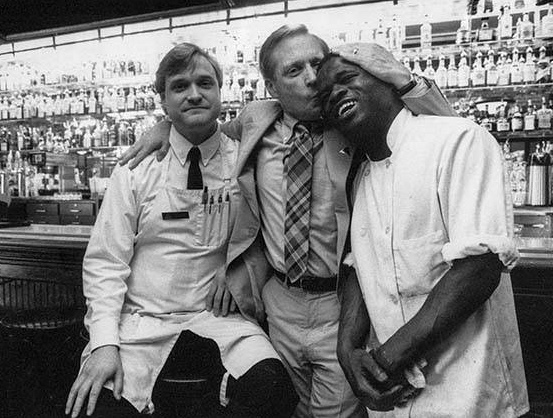The other night, I experienced the kind of catastrophic scenario waiting tables that haunts every server’s dreams. One of my tables ordered the most expensive steak on the menu, a prime dry-aged cut of quasi-Wagyu beef from a boutique farm somewhere in bumblefuck that massages the cows and feeds them beer or whatever. You wouldn’t believe the price if I told you, so I won’t bother mentioning it.
When the runner plowed through the kitchen double doors hoisting a tray with their food, the steak plate flopped over and everything, including all of their sides dishes, slipped off the tray and spilled onto the floor. It looked like a crime scene at a butcher shop in a gentrified neighborhood.
This caused a chain reaction. The chef went ballistic. The food runner responsible for the blooper cowered by the dish pit. I almost fainted. The manager’s face turned ghost white. Suddenly, we all went into triage mode like an EMS crew. The manager approached the table to break the unfortunate news. The chef immediately began grilling a new steak. The sommelier opened another bottle of the wine they had free of charge to begin the reclamation process.
Miraculously, the guests who ordered the steak didn’t feel victimized. They seemed surprisingly amused by the whole situation. In high-end restaurants, this is rarely the case. It’s not uncommon for people to walk out in the middle of their meals when food delays cross their patience threshold. But this party showed remarkable humility. They were even concerned that someone might have been hurt when the tray collapsed. I thanked them profusely for being so gracious and promised we’d make their dessert course extra soigné.
The wait for the replacement steak was excruciating. The truth is, most of the time when crisis situations like this happen in hospitality, the staff suffers through it more than the guests do. In restaurants, timing is everything. Minutes feel like hours, and servers bear the burden of long kitchen waits every night like a constant ticking time bomb.

The re-fired steak took forty-five minutes before it was delivered, but it came out perfectly cooked. The guests loved it, but it helped that they didn’t want to hate it. We sent almost the entire dessert menu with our compliments, including a special table-side presentation that drew everyone’s attention. Other tables might have presumed they were friends of the owners. We treated them like royalty because they’d acted like it.
How a restaurant staff performs in crisis situations says a lot about the culture of the restaurant. They should take guests’ bad service experiences even more seriously as good ones. Do they run and hide from conflict or do they address it head on and take responsibility for any wrongdoing? But how guests respond to these crises says a lot about them, too. For people who depend on external sources to make them happy, most likely issues with disappointing food or perceived bad service will exacerbate their misery. Those anchored by inner happiness aren’t as likely to be unmoored by choppy wa ters.
It’s critical to acknowledge that when things go wrong in restaurants that it’s rarely about negligence or even incompetence. More often, service issues result from unforeseen turbulence or the grinding gears that result from the difficulty in trying to make so many different people—with unique tastes and personalities—happy simultaneously.
Yes… you always have the right to be upset. But you also have the choice to show mercy. Try to imagine yourself in the shoes of your caretakers, and you might respond more charitably. Calling off the dogs when things go awry will make you more worthy of hospitality, the sincere kind. It’s never a pleasure to take care of people who bully their way into restitution. Having the attitude that the “customer is always right” might get you what you want, but it will never get you respect.


[…] says—our guests are truly godlike, it shouldn’t be too much to expect for them, like God, to also be merciful. In the name of the Father, the Son and the Holy Guest. […]
[…] profitably selling food in a rented space. To help restaurants recover, the industry will need us to be more empathic. If this empathy already existed, you wouldn’t see so many entitled “foodies” writing online […]